Fewer food drops ahead: The Food Basket says they are not sustainable at the current frequency
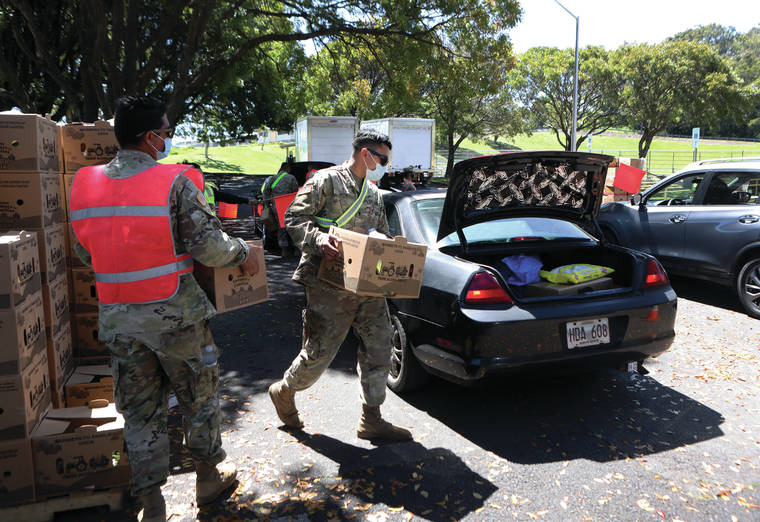
Kelsey Walling/Tribune-Herald National Guard specialists Lawrence, left, and Aron load a car with food at the Ohana Food Drop by The Food Basket in Honokaa on Friday, April 30, 2021.
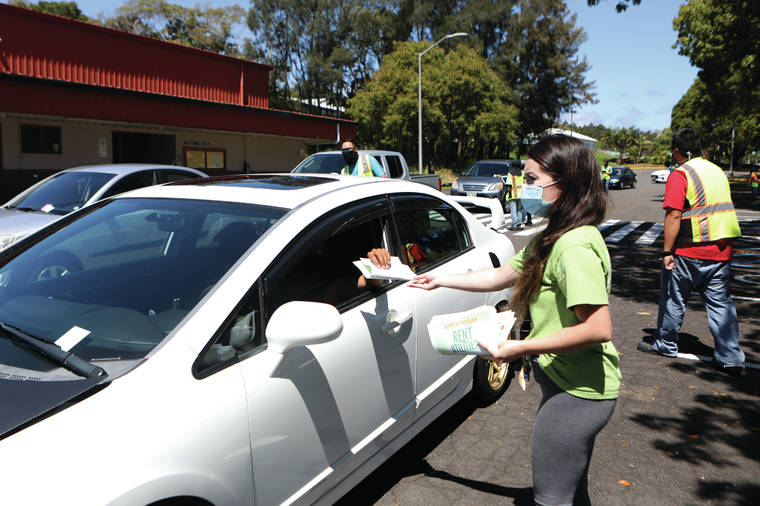
Kelsey Walling/Tribune-Herald Keani Franco hands out information on rental assistance while people attend the Ohana Food Drop by The Food Basket in Honokaa on Friday, April 30, 2021.
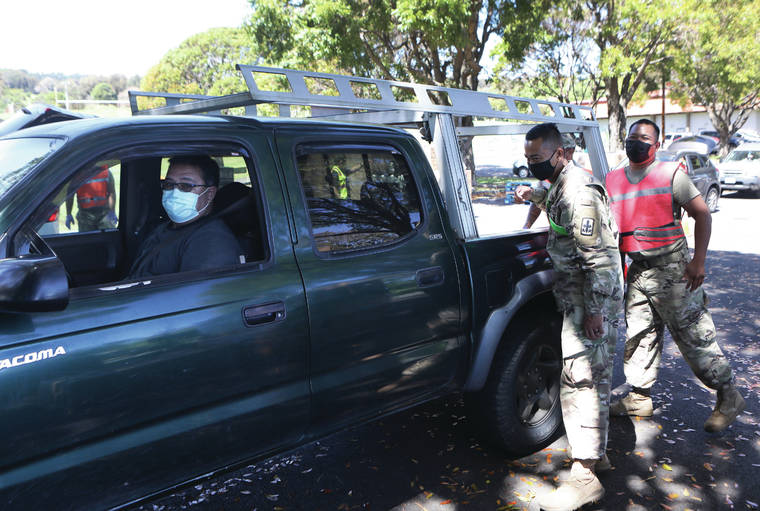
Kelsey Walling/Tribune-Herald Two National Guard members load a truck while people attend the Ohana Food Drop by The Food Basket in Honokaa on Friday, April 30, 2021.
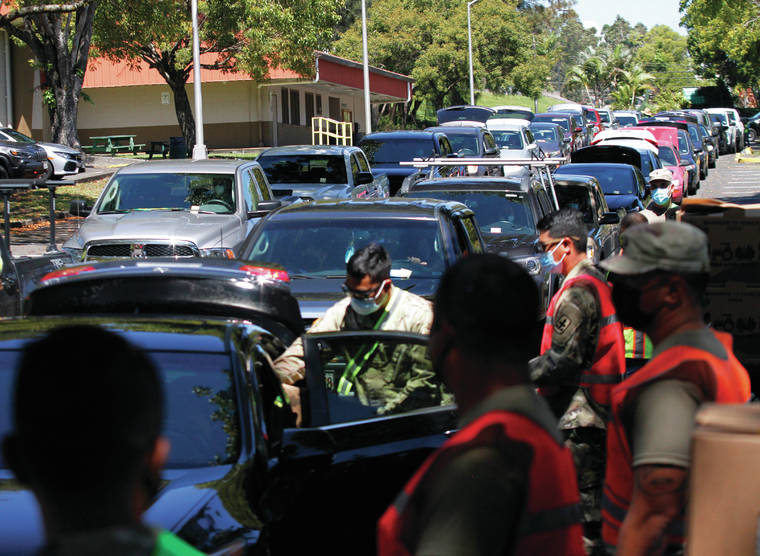
Kelsey Walling/Tribune-Herald Volunteers load cars with food while people wait their turn at the Ohana Food Drop by The Food Basket in Honokaa on Friday, April 30, 2021.

Members of the National Guard load a lifted truck with food while volunteering at the Ohana Food Drop by The Food Basket in Honokaa on Friday, April 30, 2021. (Kelsey Walling/Hawaii Tribune-Herald)

A dog hangs out in the bed of a truck while people attend the Ohana Food Drop by The Food Basket in Honokaa on Friday, April 30, 2021. (Kelsey Walling/Hawaii Tribune-Herald)
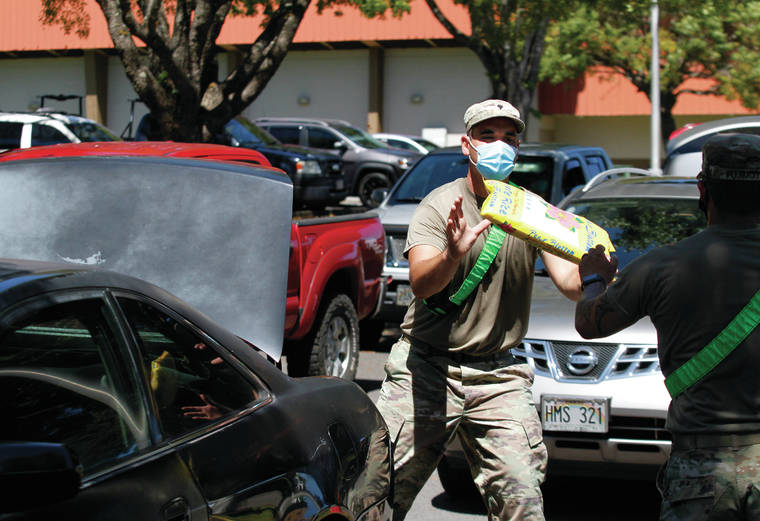
Sean Bell catches a bag of rice while volunteering at the Ohana Food Drop by the Hawaii Food Basket in Honokaa on Friday, April 30, 2021. (Kelsey Walling/Hawaii Tribune-Herald)
The Hawaii Food Basket plans to scale back the Ohana Food Drops after serving tens of thousands of people across the Big Island for more than a year.
The Hawaii Food Basket plans to scale back the Ohana Food Drops after serving tens of thousands of people across the Big Island for more than a year.
The well-attended food drops have become a regular source for bulk groceries for people who have been struggling with unemployment and other financial insecurity during the COVID-19 pandemic.
“The food drops are not sustainable,” said Leelan Park, COVID-19 project manager for The Food Basket. “They are huge events that we won’t be able to do for much longer, so we’ve decided to start scaling back the program.”
When the pandemic hit in March 2020, food pantries across the county could not operate normally due to safety measures set by the U.S. Centers of Disease Control and Prevention and the subsequent lockdown requirements.
“Pantries and food agencies were not prepared for the volume of people needing food or the COVID restrictions in the beginning of the pandemic,” said Kristin Frost Albrecht, executive director of The Food Basket. “With all of the food insecurity, we had to take our food drops to the next level.”
The Food Basket started the food drop program slowly but eventually ramped up to serve 15 communities a month at the height of the pandemic.
Some locations garner thousands of people every time The Food Basket arrives, which has required a lot of planning and manpower.
The Food Basket served eight locations in April and will continue with that number through May. In June, the nonprofit plans to serve six locations and then move to five for July and August.
“We have seen some major decrease in attendance on some parts of the island, given that some hospitality workers are getting back to work,” Frost Albrecht said. “At the same time, we’ve seen record numbers at some locations and hear from people that they have a year’s worth of unpaid bills. It’s a catch-22 for us.”
Luzolica De La Rosa attended the Ohana Food Drop in Honokaa on Friday, just like she does every month.
“We have a limited income, so these have become so helpful for my family,” De La Rosa said. “I’m going to keep coming to these as long as they are here or Waimea. If they end up stopping the drops, we’ll find a way to get by.”
Dustin Hall has been attending the food drops in Honokaa for the last four months, which have proven helpful for his large family.
“I have four daughters, so anything would help us out anytime,” Hall said. “If the food drops end in a few months, the beauty of Hawaii is that there are always people out there helping the community.”
In 2020 alone, the Food Basket purchased about 6.5 million pounds of food, which cost the organization about $3 million.
“We don’t normally buy food, but we’ve had to buy most of it this year and spend much more than we’re used to,” Albrecht Frost said. “Luckily, we have had over 6,500 incredible donors coming from foundations, individuals and businesses.”
When The Food Basket began purchasing food, organizers realized they could get everything they needed locally. Volunteers are able to regularly distribute produce and meat that comes from farms across the island.
“One thing we’ve learned is that everyone loves fresh produce and protein from the island,” Frost Albrecht said. “It made us see that there is a possibility of food security on the island. We just need to make it more available to local populations and make it affordable.”
The Food Basket has received consistent help with the food drops from county workers, community organizations and National Guard members.
“Volunteers are starting to get redirected and are getting back to some normalcy as more people are vaccinated,” Frost Albrecht said. “The food drops would become impossible without the amount of manpower we have, especially from the National Guard.”
During normal operations, The Food Basket typically aggregates food, and its 150 partners will take as much as they need from the bank for a community pantry or a soup kitchen. Those partners are now getting back to some normalcy, as well.
“Many places couldn’t operate during the pandemic, because they had elderly volunteers or they couldn’t accept food donations,” Park said. “Now that many of them can open up, we can pivot from our large-scale food drops and assist people in finding these places.”
To alleviate the need for a bulk food drop, The Food Basket will begin to list the different locations of its partners on its website, so people in need of food can reach out to the closest facility.
“We know many people haven’t gone to a pantry before, so we will be available to help people connect with agencies as much as possible,” Park said. “We also encourage anyone who may be eligible for (the Supplemental Nutrition Assistance Program) or EBT to apply.”
The Food Basket has SNAP outreach specialists located in Hilo and Kona who can help people apply for these programs.
While the food drops may be coming to an end in a few months, The Food Basket will continue to monitor community need and help in areas that might be struggling over time.
“We have seen that we live in a community that takes care of each other, and that has been the biggest part of why we’ve been able to keep these food drops going,” Frost Albrecht said. “If we see any community in need, we will make sure we can help in some way.”


